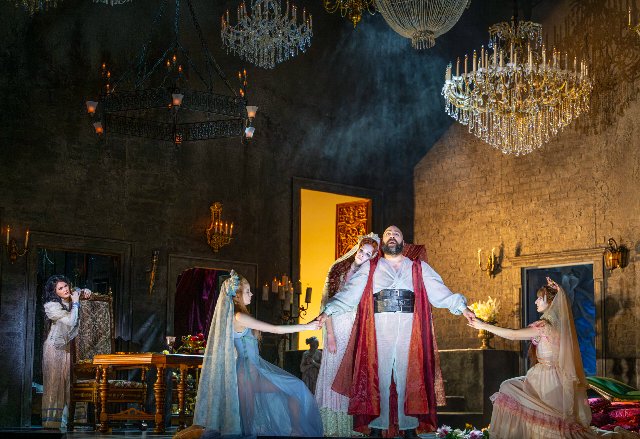Bluebeard's Castle
Opera San Jose Excels in Production of Bartok's Gem
By: Victor Cordell - Feb 17, 2025
Like Ludwig von Beethoven a century earlier, classical music giant Béla Bartók had only one opera in him, or perhaps he bridled at the notion of having to put his abstract musical construction into words again. His singular contribution was a one-act, one-scene, two-hander vignette of only 70 minutes duration. Fortunately, while this musical drama is a very small production, it sparkles like a multi-carat gem. Opera San Jose has produced a stunning rendition that dazzles, reflecting all of its brilliant facets.
Based on a French fairytale, Bartók’s musical fantasy is set to Béla Balázs’s libretto of Bluebeard’s Castle, which takes place in real time. Judith, Count Bluebeard’s new wife, has set foot in his castle for the first time, suggesting that they did not have much of a courtship and have much to learn about one another.
Set Designer Steven C. Kemp’s imposing stage is a great room with spare furnishings but a dozen chandeliers of various designs and seven imposing and unique doors, creating a sense of instability that would not be rendered by repeating identical lighting and portal features. Interestingly, all of the chandeliers and doors are veterans of past Opera San Jose productions. How’s that for artistic recycling?
Bluebeard is the stereotype of a dominant male - power-driven, combative, and misogynistic. Zachary Nelson as Bluebeard conveys his authority with an imperious presence, and his deep baritone fits the role well. He initially resists Judith’s requests to see what is behind the seven doors, choosing to preserve his secrets to maintain the status quo. Ultimately, perhaps feeling that he will still exercise control, he gives in to Judith’s curiosity. The opening of each door reveals more about Bluebeard, from his willingness to commit violence to the fruits of his conquests, both in terms of land and ladies.
Bluebeard holds the elevated social station and the possessions, yet Judith asserts herself with feminist demands. Even though she claims that love drives her need to know what is behind the doors, we don’t really know if love was part of the marriage equation. Judith seems more driven by competition, the power struggle between spouses. Given the greater performing time to express herself and being the initiator of this psychological combat, the opera really belongs to Judith, the unsettling force.
Soprano Maria Natale leaves nothing on the table as the emotive and insistent Judith. What surprises is that her specialty has been in the more lyric Italian repertoire, yet she showcases strong dramatic vocalization throughout a very demanding performance. On stage for the duration, she dominates the action and remarkably sustains her voice with an insistent, controlled, penetrating, high-volume middle range that could be more natural to a mezzo-soprano. But together with her acting that reflects the character’s emotions from eroticism to rage, it is hard to imagine a finer singing and acting performance of this role than Natale’s.
Bartók’s musical palette contains some harsh dissonance, which is modulated by the melodic influences of Hungarian folk music and the sensuality of Debussy, with whom he had mutual admiration. The dynamics of the score rise and fall, especially in response to the opening of the doors, with ominous clash in those that reveal the dark side, and with lush luxuriance in the case of those that show the fruit of Bluebeard’s missions. But one haunting musical and psychological motif throughout is that of the presence of blood beyond each door, which taints even the otherwise pleasant unveilings.
Opera San Jose’s Music Director Joseph Marcuso conducts the shifting musical moods and idioms with grace. The orchestra, which is large relative to the cast and gives a bigger feel to the opera, responds to demands with great alacrity.
Marcuso has taken a gamble in adapting the libretto which is built around poetic meter specifically fitting Magyar folk ballads. He and collaborator Steven White have translated it to English. Perhaps hearing the opera in Magyar would provide a stronger sense of the origins of the action, but most of us will never know. Happily, having the dialogue in English reduces the reliance on supertitles and makes the text more accessible.
OSJ’s General Director and CEO Shawna Lucey stage directs Bluebeard’s Castle, and all aspects of the production integrate well into an intensely rewarding operatic experience. She has also taken significant liberty with the nonverbal aspects of the drama, especially to update its message after the opening of the golden seventh door. The major change will not be shared here. It does provide surprise, drama, and an outcome that will be more satisfying to most opera goers than the original.
Bluebeard’s Castle, composed by Béla Bartók based on a fairytale from Chales Perrault with libretto by Béla Balázs and translation by Steven White and Joseph Marcuso, is produced by Opera San José and plays at the California Theater, 345 First Street, San Jose, CA through March 2, 2025.




